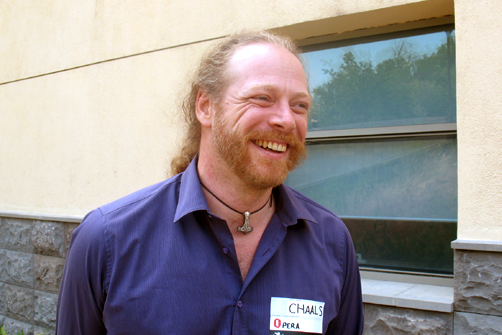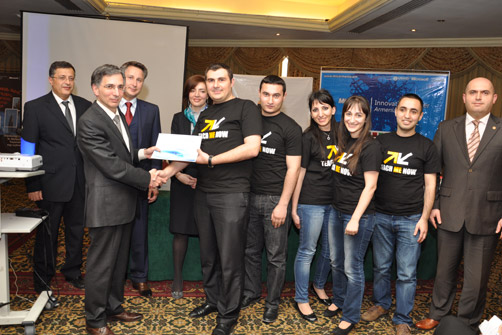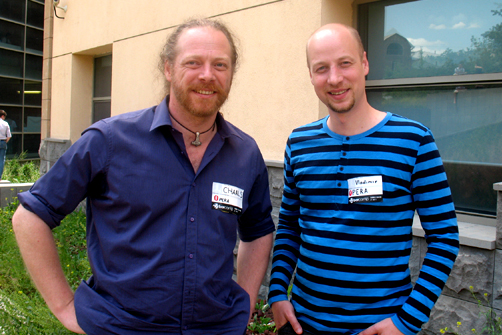-

Charles McCathieNevile
10:59 | 20.06.11 | Interviews | 12114
Charles McCathieNevile: “The future belongs to open web-standards”
The role of internet in our life increases constantly and dynamically. Both in work and in everyday life, people depend on network solutions more and more, and the majority of software support, produced in the world today, is meant for online use. Together with that, web standards become more and more important. They allow global network units “understanding” each other and interacting. A bright example of such a web standard is the HyperText markup language (HTML), which has become a universal language for designing web pages.
Charles McCathieNevile, Chief Standards Officer at OperaSoftware, works on making best web elaborations available for the world in the form of open standards.
On June 3-4, for the first time Charles visited Yerevan, where he participated in BarCamp informal IT-conference. In an interview to Mediamax and Itel.am, he spoke of how web standards are established, how important they are and what internet will look like in future.
- Opera Software, besides production of web browsers and the accompanying soft, is also actively involved in works on elaborating and promoting open web standards. Can you, please, tell us how a standard is singled out from a number of new technologic innovations, what standards are in the process of elaboration today and how they will influence the users.
- Opera Software indeed keeps adherent to open standards, and I coordinate in this direction the work of over 30 employees of the company. Before speaking of standards in general and of open web standards in particular, let’s first distinguish between elaboration of a new technology and its transformation into a standard. Let’s imagine that Opera, or any other company, or, let’s say, a group of smart guys have an idea, which has become a new technology. If it is worth becoming a standard, a process of its promotion is initiated. A standard is something that everybody uses, and a good standard is something that makes life better.
Technological standards of internet are elaborated and introduced by the World Wide Web Consortium, W3C, where I head the Committee on Cross-Platform Applications.
The most important standard the Consortium works on right now is the fifth version of HyperText markup language (HTML5). It is not clear yet when it will be completed. 2014-2015 are the tentative years of its completion, although the major part of the work has been carried out already. We assume that individual parts of the language will be realized in browsers before HTML5 officially gains the status of W3C recommendation, namely – a standard.
Another important complex of standards the Consortium works on is related to Cascading Style Sheets (CSS), which is the formal language of description of the external look of the document, written with the use of markup language CSS3. The main goal here is to facilitate the use of internet, make it clearer and more comprehensive.
Besides, W3C constantly “issues” numerous application programming interfaces (API) and the fact expands the capacities of Network use. As API example, I can mention use of a web-camera or cell phone camera as a part of the application, geolocation, integration of applications with the address book and contacts in social networks, and many others.
- As we know, the influence of HTML5 introduction will have its effect on an average user in that the latter will no longer have to install special plug-ins in order to view video and animations on the web, as well as in order to listen to audio-files. Then, what is going to happen to proprietary technologies, such as Flash and Silverlight?
- Indeed, Flash and Silverlight are proprietary technologies, but step-by-step, operations, which one could so far realize only with the help of Flash or Silverlight, become open standards. And this means that, let’s say, one can create and view animation without the help of Flash. Thus, new developers start with learning the existing standards and the ones who were staring let’s say 10 years go, will prefer to continue working with Flash. The demand will keep proprietary technologies, such as Flash, in the market, but in prospect their substitution by open standards is unavoidable, at least where it is possible.
- Now you demonstrated on a particular example how a private closed product, which brings profit to its author, later on is substituted by a technology, which is open for public use. Does this mean that free software support will always be catching up with the proprietary product, and the latter will not be able to constantly bring profit to its author?
- Initially everything is closed, even if it is open software support and has been created publicly, since according to the definition, a standard is not a standard unless everyone starts using it. This means that today, just like always, practically all technologies will first be proprietary. Their authors are the ones to decide how long they are going to maintain control over them. Some things are created with the purpose of becoming standards and others as the property of a company for a long term.
Close technologies and standards can be associated with “The Tortoise And The Hare” Aesopian fable. Standards are the tortoise, they move slowly, and technologies (the hare), first are tested in a close mode and can turn out to be something very important and profitable. And if a thing represents something very important, people start thinking over making it a standard, and thus, not depending on its owner.
I will bring a bright example: let’s say, National Library of Armenia wants to convert all its books into a format of iPad application in order to make it available for reading on pads. For Armenia this means preservation of its national heritage in a digital and available format. At that, you should be sure that Apple will continue producing these computers in future as well, but Apple does not care about the National Library of Armenia at all. Thus, in order to be sure that your work will not be lost in 20 years, when Apple, let’s assume, will not exist anymore (it is of course hard to believe this, but everything can happen, right?), you should work with open standards. So you can be sure that even if Apple or Google stop functioning, there will be companies, which work with the same standards.
- Does the history have cases, when the closing of the company, which is an owner of proprietary technologies, has led to problems for other companies?
- Of course, and the most famous one of them is the case of Netscape company. The entire dot-com economy was based on the proprietary technologies of this company in the 90s, and the economy hung in the air after Netscape stopped existing. The business models of those companies collapsed. The same enterprises, which worked with standards, supported by Netscape, simply shifted to Opera, Safari and Firefox and there are no problems. Thus, in a long-term prospect, web-standards win almost always.
Today, more and more organizations think about basing their work on open web standards from the beginning, since it is a very high risk to depend on one producer in a long-term prospect.
- You are one of the authors of what internet will be like in future. What can we expect from the Network, let’s say, 15-20 years from now?
- Let’s start with the fact that already in a couple of years 3G browsers will appear. There will be far more ways of communicating with the browser, and the work with it will become far more intuitive, more based on gestures. Web will become a guide for a greater information exchange. A cell phone, which will be one of the central web platforms, will become a universal tool for remote control for the TV set, the conditioner and the washing machine, even a car. By means of internet, an active exchange of information between a human and devices will take place. Not far off is the day, when the car, with the use of internet, will find its owner without assistance (and I already need it myself, since I often forget where I have parked). In the USA, France, Russia and other countries works are already in process for elaborating autopilot systems for cars and internet will be the environment for the transport means’ autopilot.
- Will this lead to increase or reduction of risks in general?
- I believe that in general this will reduce risks, since fewer fortuities will depend on the human factor. At the same time, the more information is sent to internet, the more we should care for its safety. The level of confidentiality and the level of publicity of information is more an issue of particular societies, rather than an issue of technologies. Technologies, in their turn, will continue adapting to the requirements of the society and will become easier to apply.
Mediamax’s Ruben Harutyunian talked to Charles McCathieNevile.
Charles McCathieNevile, Chief Standards Officer at OperaSoftware, works on making best web elaborations available for the world in the form of open standards.
On June 3-4, for the first time Charles visited Yerevan, where he participated in BarCamp informal IT-conference. In an interview to Mediamax and Itel.am, he spoke of how web standards are established, how important they are and what internet will look like in future.
- Opera Software, besides production of web browsers and the accompanying soft, is also actively involved in works on elaborating and promoting open web standards. Can you, please, tell us how a standard is singled out from a number of new technologic innovations, what standards are in the process of elaboration today and how they will influence the users.
- Opera Software indeed keeps adherent to open standards, and I coordinate in this direction the work of over 30 employees of the company. Before speaking of standards in general and of open web standards in particular, let’s first distinguish between elaboration of a new technology and its transformation into a standard. Let’s imagine that Opera, or any other company, or, let’s say, a group of smart guys have an idea, which has become a new technology. If it is worth becoming a standard, a process of its promotion is initiated. A standard is something that everybody uses, and a good standard is something that makes life better.
Technological standards of internet are elaborated and introduced by the World Wide Web Consortium, W3C, where I head the Committee on Cross-Platform Applications.
The most important standard the Consortium works on right now is the fifth version of HyperText markup language (HTML5). It is not clear yet when it will be completed. 2014-2015 are the tentative years of its completion, although the major part of the work has been carried out already. We assume that individual parts of the language will be realized in browsers before HTML5 officially gains the status of W3C recommendation, namely – a standard.
Another important complex of standards the Consortium works on is related to Cascading Style Sheets (CSS), which is the formal language of description of the external look of the document, written with the use of markup language CSS3. The main goal here is to facilitate the use of internet, make it clearer and more comprehensive.
Besides, W3C constantly “issues” numerous application programming interfaces (API) and the fact expands the capacities of Network use. As API example, I can mention use of a web-camera or cell phone camera as a part of the application, geolocation, integration of applications with the address book and contacts in social networks, and many others.
- As we know, the influence of HTML5 introduction will have its effect on an average user in that the latter will no longer have to install special plug-ins in order to view video and animations on the web, as well as in order to listen to audio-files. Then, what is going to happen to proprietary technologies, such as Flash and Silverlight?
- Indeed, Flash and Silverlight are proprietary technologies, but step-by-step, operations, which one could so far realize only with the help of Flash or Silverlight, become open standards. And this means that, let’s say, one can create and view animation without the help of Flash. Thus, new developers start with learning the existing standards and the ones who were staring let’s say 10 years go, will prefer to continue working with Flash. The demand will keep proprietary technologies, such as Flash, in the market, but in prospect their substitution by open standards is unavoidable, at least where it is possible.
- Now you demonstrated on a particular example how a private closed product, which brings profit to its author, later on is substituted by a technology, which is open for public use. Does this mean that free software support will always be catching up with the proprietary product, and the latter will not be able to constantly bring profit to its author?
- Initially everything is closed, even if it is open software support and has been created publicly, since according to the definition, a standard is not a standard unless everyone starts using it. This means that today, just like always, practically all technologies will first be proprietary. Their authors are the ones to decide how long they are going to maintain control over them. Some things are created with the purpose of becoming standards and others as the property of a company for a long term.
Close technologies and standards can be associated with “The Tortoise And The Hare” Aesopian fable. Standards are the tortoise, they move slowly, and technologies (the hare), first are tested in a close mode and can turn out to be something very important and profitable. And if a thing represents something very important, people start thinking over making it a standard, and thus, not depending on its owner.
I will bring a bright example: let’s say, National Library of Armenia wants to convert all its books into a format of iPad application in order to make it available for reading on pads. For Armenia this means preservation of its national heritage in a digital and available format. At that, you should be sure that Apple will continue producing these computers in future as well, but Apple does not care about the National Library of Armenia at all. Thus, in order to be sure that your work will not be lost in 20 years, when Apple, let’s assume, will not exist anymore (it is of course hard to believe this, but everything can happen, right?), you should work with open standards. So you can be sure that even if Apple or Google stop functioning, there will be companies, which work with the same standards.
- Does the history have cases, when the closing of the company, which is an owner of proprietary technologies, has led to problems for other companies?
- Of course, and the most famous one of them is the case of Netscape company. The entire dot-com economy was based on the proprietary technologies of this company in the 90s, and the economy hung in the air after Netscape stopped existing. The business models of those companies collapsed. The same enterprises, which worked with standards, supported by Netscape, simply shifted to Opera, Safari and Firefox and there are no problems. Thus, in a long-term prospect, web-standards win almost always.
Today, more and more organizations think about basing their work on open web standards from the beginning, since it is a very high risk to depend on one producer in a long-term prospect.
- You are one of the authors of what internet will be like in future. What can we expect from the Network, let’s say, 15-20 years from now?
- Let’s start with the fact that already in a couple of years 3G browsers will appear. There will be far more ways of communicating with the browser, and the work with it will become far more intuitive, more based on gestures. Web will become a guide for a greater information exchange. A cell phone, which will be one of the central web platforms, will become a universal tool for remote control for the TV set, the conditioner and the washing machine, even a car. By means of internet, an active exchange of information between a human and devices will take place. Not far off is the day, when the car, with the use of internet, will find its owner without assistance (and I already need it myself, since I often forget where I have parked). In the USA, France, Russia and other countries works are already in process for elaborating autopilot systems for cars and internet will be the environment for the transport means’ autopilot.
- Will this lead to increase or reduction of risks in general?
- I believe that in general this will reduce risks, since fewer fortuities will depend on the human factor. At the same time, the more information is sent to internet, the more we should care for its safety. The level of confidentiality and the level of publicity of information is more an issue of particular societies, rather than an issue of technologies. Technologies, in their turn, will continue adapting to the requirements of the society and will become easier to apply.
Mediamax’s Ruben Harutyunian talked to Charles McCathieNevile.

17:29 | 24.09.25 | Articles
Jacopo Losso on Cross-Border Investments and Why Armenia Attracts Angels








